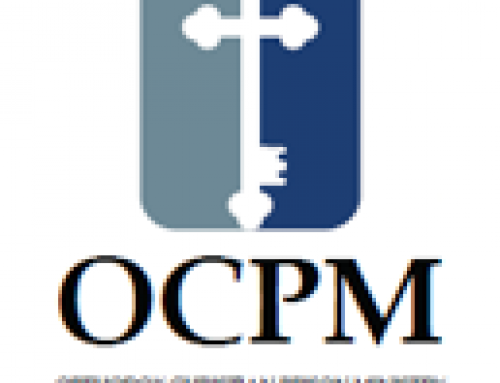This post was originally published on this site
This discussion is made up of two parts, with each part containing a reflection and a set of discussion questions. Either with your OCF chapter, a friend or two, or just on your own, read each reflection and discuss the questions related to it. You can choose to break the discussion into multiple sessions, tackling a portion each week, or you can do the whole thing in one sitting.
Opening Prayer
Jesus Christ, my Lord and God, I give thanks for your loving kindness and all the blessings You have richly bestowed upon me. I fall down in worship and adoration before You, the King of Glory. I praise You, I glorify You, I bless You and I give thanks to You for Your great goodness and tender mercy. To You I come, my sweet Lord and loving Master. Shine in my heart the light of Your grace. Enlighten my mind, that I may walk uprightly all my life by keeping Your commandments. Glorified and exalted is Your holy name, now and forever. Amen.
Part I: Our Call to Give
Reflection
“The Lord said this parable: “The land of a rich man brought forth plentifully, and he thought to himself, ‘What shall I do, for I have nowhere to store my crops?’ And he said, ‘I will do this: I will pull down my barns, and build larger ones; and there I will store all my grain and my goods. And I will say to my soul, ‘Soul, you have ample goods laid up for many years; take your ease, eat, drink, be merry.’ But God said to him, ‘Fool! This night your soul is required of you; and the things you have prepared, whose will they be?’ So is he who lays up treasure for himself, and is not rich towards God.” As he said these things, he cried out: “He who has ears to hear, let him hear.”[1]
“The bread in your cupboard belongs to the hungry man; the coat hanging unused in your closet belongs to the man who needs it; the shoes rotting in your closet belong to the man who has no shoes; the money which you put in the bank belongs to the poor. You do wrong to everyone you could help, but fail to help.”[2]
It is the beginning of a new year, and for many of us, a time to restart our lives with new goals and new perspectives. We may make goals to improve our health or plans to become more organized in our studies. Some of us even feel inspired to have a more disciplined prayer rule, or to attend more church services. What about goals of almsgiving?
Almsgiving always coincides with prayer and fasting, as it displays our love for God through serving our neighbors. Our call to give does not always mean to give away all of our possessions and live as a hermit, but to serve unconditionally to everyone we encounter.
Questions to Discuss
- Think about the rich man in the parable in Luke, and how he was so eager to build more storehouses for himself. How can you relate to this man? What are your storehouses?
- Since we are both physical and spiritual beings, almsgiving should be targeted to serve both of these needs. What are some practical ways we can practice almsgiving for ourselves? If you are by yourself, think of some personal goals. If you are with your OCF Chapter, plan some ideas as a group.
- In what ways do you currently use your money any differently than you would if you were not an Orthodox Christian? Identify some areas in your life that you can surrender to Christ.
Part 2
“Do you wish to honor the Body of the Savior? Do not despise it when it is naked. Do not honor it in church with silk vestments while outside it is naked and numb with cold. He who said, “This is my body,” and made it so by his word, is the same who said, “You saw me hungry and you gave me no food. As you did it not to the least of these, you did it not to me.” Honor him then by sharing your property with the poor. For what God needs is not golden chalices but golden souls.” St. John Chrysostom “On the Gospel of St. Matthew”, 50, iii (PG 58, 508)
Almsgiving can oftentimes denote monetary donations or contributions to those in need, but in actuality, giving alms can simply be to show mercy and compassion on our brothers and sisters. In fact, the Greek word for alms“eleemosune”literally translates to actions of mercy and compassion. We see how almsgiving is so interwoven in our worship, our theology, and our faith. We constantly hear the petition “Lord have mercy” during our liturgies, we pray for the Lord’s mercy with our prayer robes, and we frequently recite Psalm 50 in our services. Mercy is at the centrality of our faith. As we pray for the Lord to have mercy on us, we in turn must show mercy on those that hurt us, those that wrong us, and those that need love. Let us learn from the Gospel and a few words of the Saints of the Church.
“Blessed are the merciful, for they shall obtain mercy.” (Matthew 5:7)
“Let words of consolation leap forward before the rest of your speech, confirming your love for your neighbor.” (Saint Basil)
“The rich exist for the sake of the poor. The poor exist for the salvation of the rich.” (Saint John Chrysostom)
As Orthodox Christians and servants of the Lord we are called to love one another faithfully, fervently enduring one another’s sorrows and joys. In Galatians 6:2, Saint Paul states that we are to “bear one another’s burdens”, suffering with one another in brotherly love. Our relations with our neighbors are of utmost importance in our daily life, as we are called to be a living icon, a home for those without shelter, and ultimately a loving and giving force. We are all members of Christ’s body, each presenting different skills and talents that work together to create harmony in the Church. Saying this, all members are called to serve one another. “If one member suffers, the others are sorry for it and help it. If one member rejoices, all the members rejoice; our whole body rejoices.” [3] Ultimately, we are called to bring love and light to each other, to see the image of Christ in every living thing. Almsgiving is more than a transactional relationship to gain mercy from God, but a way to achieve living communion with Him. Christ on the Cross demonstrated the awe-inspiring unconditional love and mercy for the other, and in order to be more like Him, we must show mercy on our neighbor. Our love for one another should be shining on our faces, spoken in our speech, felt in our touch, and embedded in our hearts.
Discussion Questions:
- We live in a highly materialistic culture, as we are bombarded by new things to eat, more things to buy, and more people to be like. Sometimes it feels as though darkness is all around us in the world. What are a few ways you can combat this, and walk in the light of Christ?
- Many early Christians would hand over all of their riches and possessions to a community fund and share with any person in need. How are we able to emulate this same charity in our day and age?
[1] Luke 12:16-21
[2] On Wealth and Poverty, 110
[3] 1 Cor 12:26-27



